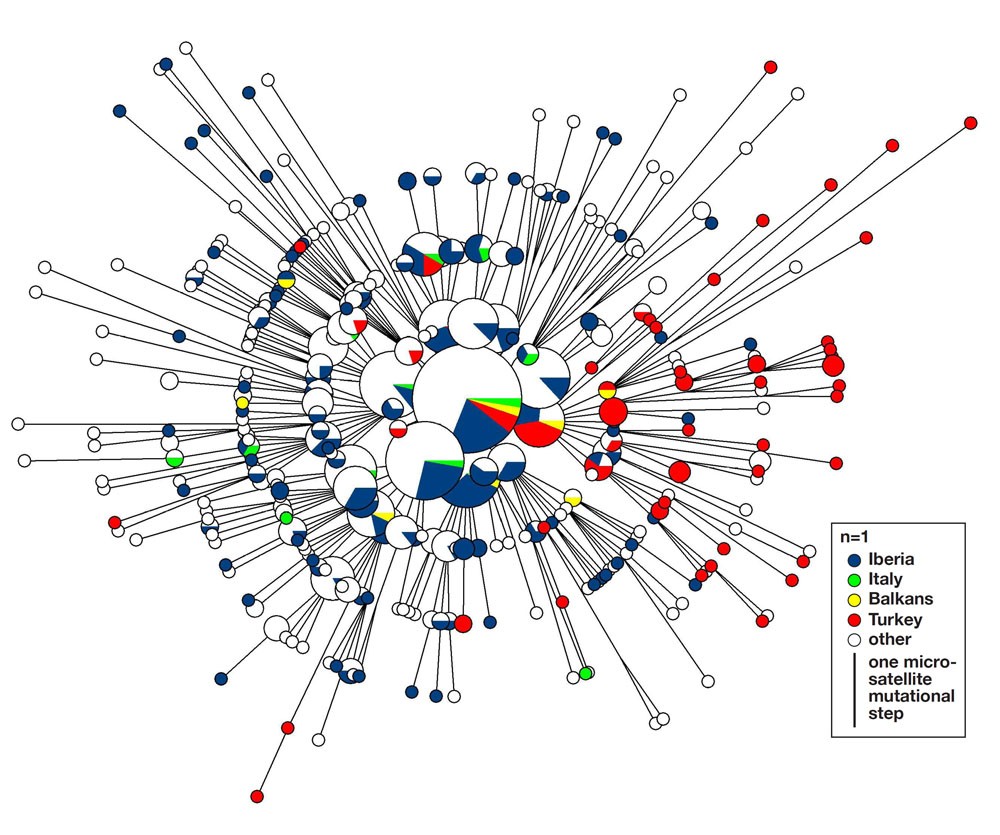Gentlemen or farmers?

The invention of farming is perhaps the most important cultural change in the history of modern humans. Increased food production led to the development of societies that stayed put, rather than wandering in search of food. The resulting population growth culminated in the seven billion people who now live on the planet. In Europe, farming spread from the ‘Fertile Crescent’, a region extending from the eastern Mediterranean coast to the Persian Gulf and including the Tigris and Euphrates valleys.
There has been much debate about whether the westerly spread of agriculture from the Near East was driven by farmers actually migrating, or by the transfer of ideas and technologies to indigenous hunter-gatherers. Now, researchers have studied the genetic diversity of modern populations to throw light on the processes involved in these ancient events.
“All over the world, wherever geneticists looked at other farming expansions, the incoming farmers were replacing the indigenous men. But not in Europe. Europe seemed to be the glorious exception, where the farmers instead taught their methods to the hunters and gatherers and then quietly passed away: true gentlemen. Unfortunately, we have now discovered that this rosy view is not accurate. European farmers were just like the others, concentrating on transmitting their own genes.”
Dr Chris Tyler-Smith From the Wellcome Trust Sanger Institute and an author on the study
The new study, funded by the Wellcome Trust, examines the diversity of the Y chromosome, which is passed from father to son.
“We focused on the commonest Y-chromosome lineage in Europe, carried by about 110 million men. It follows a gradient from south-east to north-west, reaching almost 100 per cent frequency in Ireland. We looked at how the lineage is distributed, how diverse it is in different parts of Europe, and how old it is.”
Mark Jobling From the University of Leicester and senior author on the study
The results suggested that the lineage spread together with farming from the Near East.
“In total, this means that more than 80 per cent of European Y chromosomes descend from incoming farmers. In contrast, most maternal genetic lineages seem to descend from hunter-gatherers. To us, this suggests a reproductive advantage for farming males over indigenous hunter-gatherer males during the switch from hunting and gathering, to farming – maybe, back then, it was just sexier to be a farmer.”
Dr Patricia Balaresque From Université Paul Sabatier, France, and first author of the study
More information
Funding
This work was supported by the Wellcome Trust.
Participating Centres
- Department of Genetics, University of Leicester, University Road, Leicester, UK
- Laboratoire d’Etude du Polymorphisme de l’ADN, Faculté de Médecine, Nantes, France
- Molecular Medicine Research Group, Peninsula Medical School, Universities of Exeter and Plymouth, Plymouth, UK
- Dipartimento di Biologia ed Evoluzione, Università di Ferrara, Ferrara, Italy
- Dipartimento di Medicina Legale e Sanità Pubblica, Università di Pavia, Pavia, Italy
- Institute of Human Genetics, Newcastle University, Newcastle upon Tyne, UK
- The Wellcome Trust Sanger Institute, Wellcome Trust Genome Campus, Hinxton, UK
Publications:
Selected websites
The Wellcome Trust Sanger Institute
The Wellcome Trust Sanger Institute, which receives the majority of its funding from the Wellcome Trust, was founded in 1992. The Institute is responsible for the completion of the sequence of approximately one-third of the human genome as well as genomes of model organisms and more than 90 pathogen genomes. In October 2006, new funding was awarded by the Wellcome Trust to exploit the wealth of genome data now available to answer important questions about health and disease.
The Wellcome Trust
The Wellcome Trust is a global charitable foundation dedicated to achieving extraordinary improvements in human and animal health. We support the brightest minds in biomedical research and the medical humanities. Our breadth of support includes public engagement, education and the application of research to improve health. We are independent of both political and commercial interests.


